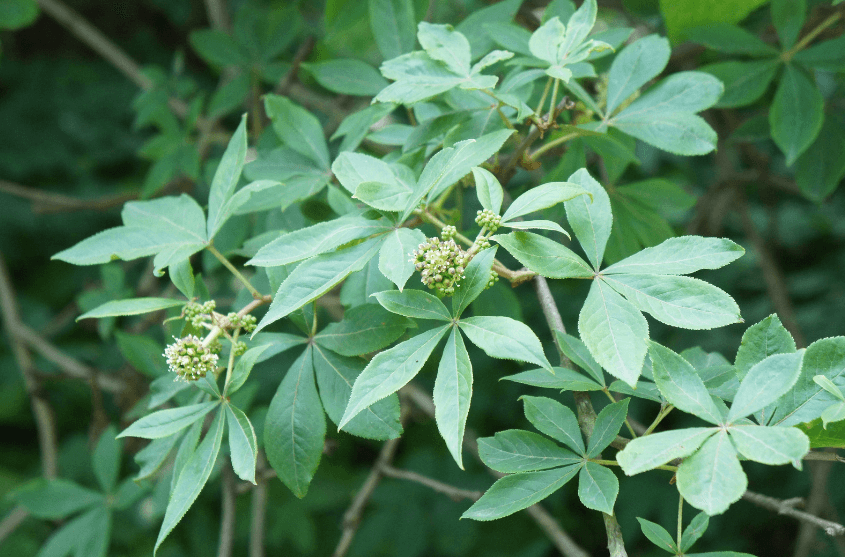
Eleuthero
Share

Common Name Panax ginseng, Russian ginseng, tiger ginseng, Siberian ginseng
Family Name Araliaceae
Parts Used Leaf Roots
Herbal Actions Anti-inflammatory and anti-fatigue
Health Benefits Energy, Mental Focus, Performance
What are the Benefits of Eleuthero?
One of the most touted benefits of Eleuthero is its potential to enhance mental clarity. The herb is believed to stimulate cognitive function, potentially improving focus and concentration.
Research suggests that Eleuthero may have neuroprotective effects. These effects could play a role in maintaining brain health and preventing cognitive decline.
Incorporating Eleuthero into your wellness routine could, therefore, contribute to improved mental performance. Whether you're studying for an exam or tackling a complex project, Eleuthero might be a valuable ally.
Eleuthero is often used by athletes and fitness enthusiasts. The herb is believed to enhance athletic performance by increasing endurance and reducing fatigue.
Studies suggest that Eleuthero may help the body utilize oxygen more efficiently. This could potentially lead to improved stamina and faster recovery times after intense physical activity.
Incorporating Eleuthero into your training regimen could, therefore, provide a natural boost to your athletic performance. Whether you're a professional athlete or a weekend warrior, Eleuthero might help you reach your fitness goals.
Eleuthero is also known for its potential immune-boosting properties. It's thought to stimulate the production of lymphocytes, which play a crucial role in the body's immune response.
In addition to supporting the immune system, Eleuthero may contribute to cardiovascular health. It's been studied for its potential to regulate blood pressure and improve circulation.
By incorporating Eleuthero into your wellness routine, you could potentially enhance your body's natural defenses and promote heart health.
Historical Use of Eleuthero
The historical use of Eleuthero, a small woody shrub native to Northeastern Asia, is steeped in rich tradition. Known for its adaptogenic properties, it has been a staple in traditional Chinese and Russian folk medicine for centuries.
The Origins of Eleuthero in Ancient Medicine
Eleuthero, also known as Siberian Ginseng, has been used for thousands of years, particularly in traditional Chinese medicine. Despite not being a true ginseng, it shares similar properties, earning it the moniker.
Historically, Eleuthero was used to increase stamina and endurance, and to promote longevity. Its roots, rich in active compounds like eleutherosides, were harnessed to improve general health, boost energy levels, and enhance mental sharpness.
Eleuthero in Traditional Chinese Medicine
In the realm of traditional Chinese medicine, Eleuthero was revered for its ability to invigorate qi, strengthen the spleen, and support kidney yang. These uses were believed to enhance vitality and overall well-being.
Historical texts suggest Eleuthero was also used to prevent colds and flu, treat kidney ailments, and support cognitive functions. Its use extended to improving appetite and digestion, and aiding recovery from debilitating illnesses.
Eleuthero's Rise in Russian Folk Medicine
Eleuthero gained prominence in Russia during the 20th century. It was lauded for its potential to improve performance and reduce fatigue in athletes and cosmonauts.
The herb was also used to support the immune system, particularly during times of increased stress or seasonal changes. Its adaptogenic qualities were believed to help regulate the body's hormonal responses to stress, contributing to an overall sense of well-being.
Botanical Description & Habitat
Eleuthero, or Siberian ginseng, is a deciduous shrub found in northeastern Asia's forests. It has sturdy stems, palmate compound leaves, and clusters of small white flowers in autumn. It thrives in cool, temperate climates with rich, well-drained soil, and prefers partial shade. Eleuthero reproduces through seeds dispersed by animals and via rhizomes. Human intervention, such as seed germination or vegetative propagation, helps enhance its resilience and genetic diversity.
